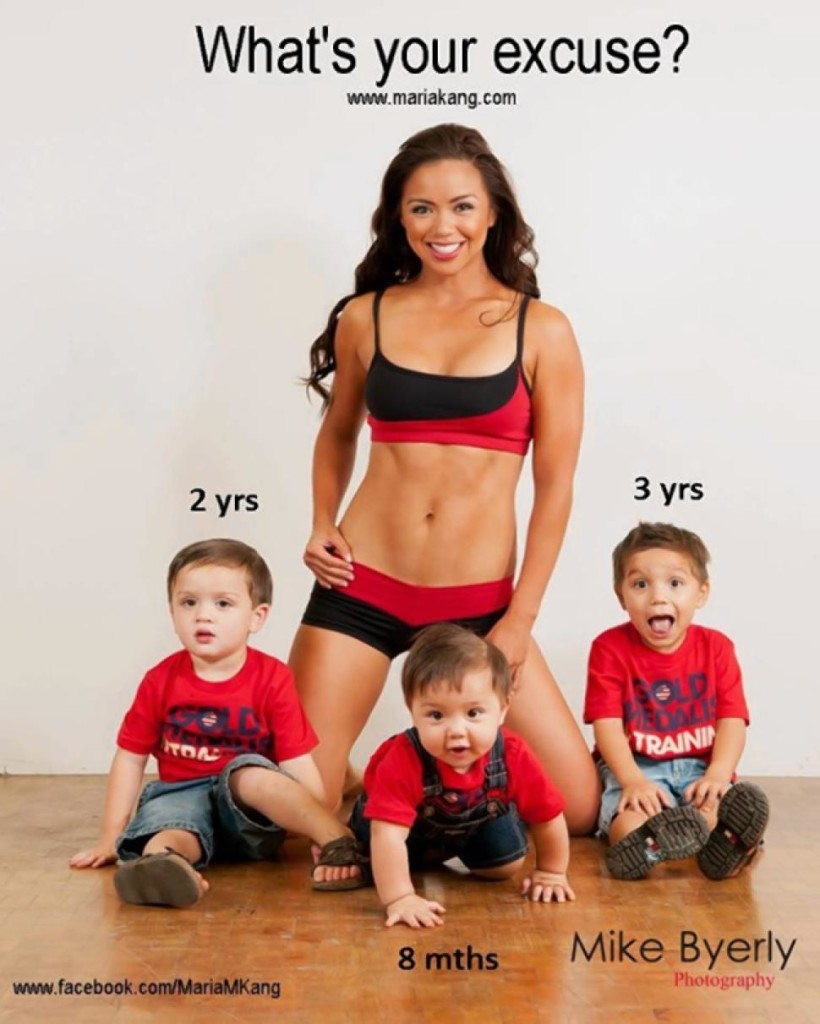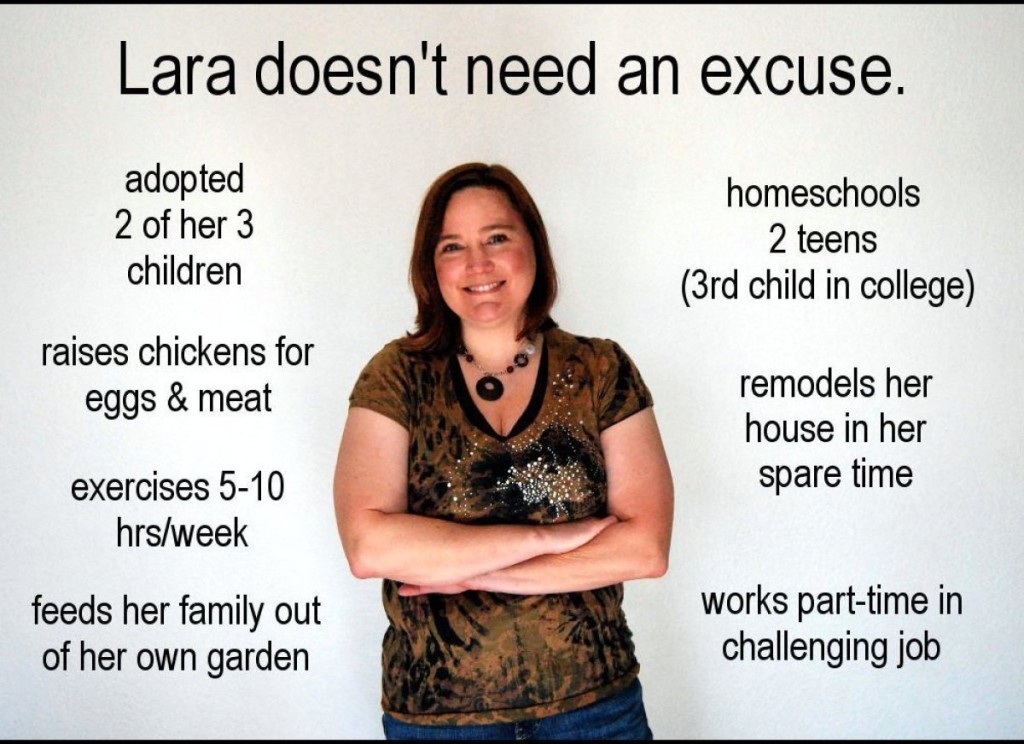You’ve seen them before: Social media posts with photographs of people in better physical shape than you. Sometimes the people in the photographs are elderly, physically disabled, or mothers of multiple children. And I understand such posts are intended to be motivational, empowering even. But they rarely come off that way, do they? Even if you don’t recognize her name, I’m sure you’ve seen a picture of Maria Kang, a business owner and mother of three who in 2013 was criticized on Facebook and elsewhere after posting a photo of her three young children and her incredibly toned abs with the caption “What’s your excuse?”
The photo caused a furor because of the accompanying implication: She got in shape and you most likely did not (statistically most American adults who saw the picture are either overweight or obese, or are not but believe they are) and because of this, there is something wrong with you. While it’s great that Ms. Kang has apparently managed to get in shape and stay that way despite overwhelming odds including a self-professed eating disorder, let’s not pretend that her post was meant to motivate others to be like her. It was meant to shame them. The thought of a woman disparaging other women who look differently rather than showing solidarity is disappointing; ultimately it says more about the person doing the shaming than the ones being shamed.
(I use the word “apparently” in the previous paragraph because while she stated in a Facebook post that she is “not naturally skinny“, she apparently included no “before” picture. After an extensive Google Image Search I was unable to find any photos of Ms. Kang at a heavier previous weight. While that doesn’t necessarily mean such photos do not exist, I would assume if she actually lost weight rather than maintaining a so-called healthy weight all her life, she would include these photos in her post to prove she’s not naturally skinny.)
Of late, I’ve noticed a number of my male friends on social media posting similar things. Without exception, these friends are all preoccupied with physical fitness. Most of the posts in question are shared or retweeted, though it isn’t uncommon to see a photo of the friend himself, preening after a particularly strenuous HIIT session, and always with the same caption: “What’s your excuse?” And I realize the regular social media posts are meant to hold themselves accountable; you’re less likely to miss a workout if you’re posting regular pictures of your progress.
One can’t fault others for detecting an accusatory tone in those words, though. Even if shaming the non-gym-going populace wasn’t the intention, the insinuation is still there: You aren’t like me, so you must have tried and failed, or worse, you didn’t even bother trying. Tell me why. So I guess I need to answer the question. What is my excuse?
Well, the truth is, I don’t need one. Because despite the assumption that I’m trying and failing to be like you, I’m actually not. I have my standard, and I don’t want or need yours. Don’t misunderstand, I don’t disapprove of your fitness regimen. Why would I? On the contrary, I think it’s fantastic that you’ve set a goal for yourself and reached it. You should be proud of yourself! Keep it up!
I mean, it’s fantastic if you’re doing it out of a desire to be healthy as opposed to a pathological need to reach some societally-prescribed ideal; that doesn’t sound healthy at all. But even if that’s the reason you’re doing it, I’m happy that you’re happy. If you’re happy.
I’m sure you see many people on a daily basis who don’t look like you look. No six-pack. Drinking soda or eating junk food. Getting winded walking up a flight of stairs. They probably don’t even go to a gym! I’m sure that when you see these people you think, “What’s their excuse? If I can do it, they can do it.” But I’m guessing that while a lot of these people try and fail, many of us simply can’t be bothered. We don’t need to be cut. We don’t care about proper deadlift form. We couldn’t tell the difference between parallel grip pull-ups and abdominal leg throw-downs. We like it better that way.
The thing is, everyone has their priorites, and many – most? – people’s priorities differ from your own. For some it’s writing or art. For others it’s raising a family, running a business, or sociopolitical advocacy. And I’m sure they could fit in a grueling workout when they’re done for the day, but for them, these priorities are enough. Hell, some people want to spend what leisure time they have sitting on their ass and playing video games or catching up on their DVR. Of the countless people you encounter every day who have failed to meet your standard, I suspect at least some of them look at you and wonder what your excuse is for not reaching the same goals they have.
So no, people like me don’t have excuses for not running a four-minute mile, or managing a perfect dynamic start. But we don’t need an excuse because these are not the goals we have set for ourselves. Fitness isn’t jury duty; we are not beholden to social media posts by friends who, though well-meaning, misunderstand that everyone in society is free to do their own thing.
Anyway, what excuse would even work? Obviously missing a leg isn’t sufficient; a Google Image Search yields many photos of people with one leg, or no legs, in far better physical shape than I’ll ever attain, many with the “What’s your excuse?” caption. So that’s out. Working two jobs while being a single parent won’t cut it either; anyone on a first-name basis with the staff at their local gym will point out that many professionals who are also parents find hours and hours to get in shape after work without having to leave their children home alone. Crippling depression and social anxiety? Nope. Obesity runs in the family? Hell no, you lazy slacker.
I know these posts are an ego trip for those who post them, so the response these people are looking for may be along the lines of, “I have no excuse. I am weaker/lazier/more pathetic than you are.” If that’s the case, feel free to interpret my words as a validation of your physical superiority and/or godlikeness. Whatever gets you through each day, I suppose.
Me, though? I’m healthy. Healthy enough, anyway. I can keep up with a five-and-a-half-year-old daughter and I’ve got energy to spare. I work out, too. I go to the gym a few times a week, or at least for a run. Still, that’s more out of a need to kill time than any desire to be the perfect physical specimen. Could I be in better shape? Of course I could, but why focus on the negative when there’s so much positive to look at instead? And while I don’t think I look particularly good naked, there are many women who disagree, my wife paramount among them, and I’m smart enough to assume they’re right and I’m wrong. Above all, though, I’m happy.
One last thing: While perusing Google Image Search, I saw a lot of photos of women who, presumably in response to Ms. Kang’s photo, listed all the things they do with their lives that preclude them from being in the exact shape Ms. Kang says they should. Some are active in their church or volunteer elsewhere in the community. Others raise special needs children, or take care of aged parents. Still others are far too busy with post-graduate work, or have a genetic predisposition to heart disease. While these are all valid reasons, I feel like I must compel these women to stop making excuses. Not because excuses get in the way of so-called perfection, but because it’s your life, and you don’t owe your critics anything.


Clearly, I’ve been living under a rock because I rarely encounter the “What’s your excuse?” caption or tag. It probably helps that I’m not on Facebook in any way or form, and I avoid the gym obsessed on Twitter.
I agree with you completely here. The problem for me with this phrase and the way it’s mobilised on social media is the way it ultimately creates an impression of “perfection,” of a body/life/standard that most of us feel beyond our grasp. Even if we don’t particularly crave the specifics of what the tag is selling or forcing down our gullets, it centres on the surface of things in a way that compels some people to “keep up with the Joneses.” I love the alternate version that closes this post as it focuses on achievements beyond a tone and muscular body – charity, love, a connection to family, the land, community. There’s a slightly evil part of me that would relish creating my own where I’m surrounded by the thousands of books that have fed my mind, the friends and lovers that have nourished my body and spirit, the hundreds of thousands of words and photographs I’ve created, the places I’ve travelled, the laughter I’ve shared.
But… I don’t want to compete or shame because we all encounter enough through our own critical voices as well as the horrid side of social media and life. More than this, I don’t want to engage with a vacuous facade that consciously sets out to make people feel less than. I want and cherish diversity.
We’ve all been shamed in one way or another – I’ve had many women on Twitter suggest I’m underweight and that I might try eating a burger or drinking a milkshake every other day – and I’ve had enough. And while these instances are perfect for analysis, which is often vital to demystifying and problematising these simplistic notions, I also think the way to deal with this is not to deal – to walk away, to unfollow, to mute, to turn our heads and ignore because silence from the masses often screams with a louder force than a torrent of words.
Fantastic post, Jack. Thank you so much for the amazing food for thought (pun intended)…
~M